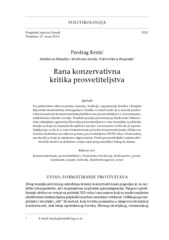Rana konzervativna kritika prosvetiteljstva
Апстракт
Na primerima odnosa prema razumu, tradiciji, organizaciji društva i drugim ključnim momentima neslaganja u članku se izlaže kako je u ranom postrevolucionarnom konzervativizmu kritikovano prosvetiteljstvo i, istovremeno, artikulisano vlastito učenje. Posebna pažnja posvećena je Berkovim i Mestrovim viđenjima ogrešenja filozofije prosvetiteljstva o onu istorijsku i političku misiju za koju su smatrali da njihove nacije i čovečanstvo treba da je ispune. Zaključuje se da je u tom formativnom periodu konzervativizam oblikovao vlastitu doktrinu na odnosu prema prosvetiteljstvu XVIII veka i Francuskoj revoluciji za koju je smatrano odgovornim. Protivprosvetiteljski i antimodernistički motivi te doktrine ostaju njen prepoznatljivi beleg do danas.
Analizing its relationship to reason, tradition, social organization and other key moments of disagreement, the article exposes how the early post-revolutionary Conservatism criticizing the Enlightenment and, at the same time, articulate their own learning. Special attention is given to Burke’s and Maistre’s visions of violations of the Enlightenment philosophy on the historical and political mission that they believed their nations and humanity should meet. It is concluded that in this formative period, in relation to the eighteenth-century Enlightenment and the French Revolution, for which the former is held responsible, conservatism formed its own doctrine, Its counter-enlightenment and anti-modernist motives therefore remain distinctive marks of Conservativism to this day.
Кључне речи:
konzervativizam / conservatism / enlightenment / French Revolution / christianity / protestantism / reason / freedom / social contract / constitution / prosvetiteljstvo / Francuska revolucija / hrišćanstvo / protestantizam / razum / sloboda / društveni ugovor / ustavИзвор:
Godišnjak Fakulteta političkih nauka, 2015, 9, 13, 205-224Финансирање / пројекти:
- Истраживање климатских промена и њиховог утицаја на животну средину - праћење утицаја, адаптација и ублажавање (RS-MESTD-Integrated and Interdisciplinary Research (IIR or III)-43007)
URI
file:///C:/Users/pc2012/Desktop/Godisnjak-FPN_br_13_jun-2015.pdfhttp://rifdt.instifdt.bg.ac.rs/123456789/1577
Колекције
Институција/група
IFDTTY - JOUR AU - Krstić, Predrag PY - 2015 UR - file:///C:/Users/pc2012/Desktop/Godisnjak-FPN_br_13_jun-2015.pdf UR - http://rifdt.instifdt.bg.ac.rs/123456789/1577 AB - Na primerima odnosa prema razumu, tradiciji, organizaciji društva i drugim ključnim momentima neslaganja u članku se izlaže kako je u ranom postrevolucionarnom konzervativizmu kritikovano prosvetiteljstvo i, istovremeno, artikulisano vlastito učenje. Posebna pažnja posvećena je Berkovim i Mestrovim viđenjima ogrešenja filozofije prosvetiteljstva o onu istorijsku i političku misiju za koju su smatrali da njihove nacije i čovečanstvo treba da je ispune. Zaključuje se da je u tom formativnom periodu konzervativizam oblikovao vlastitu doktrinu na odnosu prema prosvetiteljstvu XVIII veka i Francuskoj revoluciji za koju je smatrano odgovornim. Protivprosvetiteljski i antimodernistički motivi te doktrine ostaju njen prepoznatljivi beleg do danas. AB - Analizing its relationship to reason, tradition, social organization and other key moments of disagreement, the article exposes how the early post-revolutionary Conservatism criticizing the Enlightenment and, at the same time, articulate their own learning. Special attention is given to Burke’s and Maistre’s visions of violations of the Enlightenment philosophy on the historical and political mission that they believed their nations and humanity should meet. It is concluded that in this formative period, in relation to the eighteenth-century Enlightenment and the French Revolution, for which the former is held responsible, conservatism formed its own doctrine, Its counter-enlightenment and anti-modernist motives therefore remain distinctive marks of Conservativism to this day. T2 - Godišnjak Fakulteta političkih nauka T1 - Rana konzervativna kritika prosvetiteljstva IS - 13 VL - 9 SP - 205 EP - 224 UR - https://hdl.handle.net/21.15107/rcub_rifdt_1577 ER -
@article{
author = "Krstić, Predrag",
year = "2015",
abstract = "Na primerima odnosa prema razumu, tradiciji, organizaciji društva i drugim ključnim momentima neslaganja u članku se izlaže kako je u ranom postrevolucionarnom konzervativizmu kritikovano prosvetiteljstvo i, istovremeno, artikulisano vlastito učenje. Posebna pažnja posvećena je Berkovim i Mestrovim viđenjima ogrešenja filozofije prosvetiteljstva o onu istorijsku i političku misiju za koju su smatrali da njihove nacije i čovečanstvo treba da je ispune. Zaključuje se da je u tom formativnom periodu konzervativizam oblikovao vlastitu doktrinu na odnosu prema prosvetiteljstvu XVIII veka i Francuskoj revoluciji za koju je smatrano odgovornim. Protivprosvetiteljski i antimodernistički motivi te doktrine ostaju njen prepoznatljivi beleg do danas., Analizing its relationship to reason, tradition, social organization and other key moments of disagreement, the article exposes how the early post-revolutionary Conservatism criticizing the Enlightenment and, at the same time, articulate their own learning. Special attention is given to Burke’s and Maistre’s visions of violations of the Enlightenment philosophy on the historical and political mission that they believed their nations and humanity should meet. It is concluded that in this formative period, in relation to the eighteenth-century Enlightenment and the French Revolution, for which the former is held responsible, conservatism formed its own doctrine, Its counter-enlightenment and anti-modernist motives therefore remain distinctive marks of Conservativism to this day.",
journal = "Godišnjak Fakulteta političkih nauka",
title = "Rana konzervativna kritika prosvetiteljstva",
number = "13",
volume = "9",
pages = "205-224",
url = "https://hdl.handle.net/21.15107/rcub_rifdt_1577"
}
Krstić, P.. (2015). Rana konzervativna kritika prosvetiteljstva. in Godišnjak Fakulteta političkih nauka, 9(13), 205-224. https://hdl.handle.net/21.15107/rcub_rifdt_1577
Krstić P. Rana konzervativna kritika prosvetiteljstva. in Godišnjak Fakulteta političkih nauka. 2015;9(13):205-224. https://hdl.handle.net/21.15107/rcub_rifdt_1577 .
Krstić, Predrag, "Rana konzervativna kritika prosvetiteljstva" in Godišnjak Fakulteta političkih nauka, 9, no. 13 (2015):205-224, https://hdl.handle.net/21.15107/rcub_rifdt_1577 .



